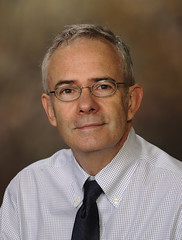Lockaby named interim dean of Auburn’s School of Forestry and Wildlife Sciences
Article body
Graeme Lockaby, associate dean of research in Auburn University’s School of Forestry and Wildlife Sciences, has been named interim dean of the school, announced today by Provost Timothy Boosinger.
“Dr. Lockaby will provide excellent leadership for the School of Forestry and Wildlife Sciences,” Boosinger said. “He has been at Auburn for 28 years and is a nationally respected authority for his work in forest sustainability.”
A national search will begin in July for a permanent dean. Lockaby succeeds Jim Shepard, who is returning to the faculty fulltime as a professor.
“We have outstanding faculty, staff and students and I look forward to working with them to enhance their research, education and outreach experiences,” Lockaby said. “Collaboration with alumni, federal and state colleagues, industry, forestry, wildlife and natural resource associations and other stakeholder groups is also very important to the success of our school and completion of our three missions.”
Lockaby, who has worked at Auburn University since 1986, is director of the school’s Center for Forest Sustainability and serves as the Clinton McClure Professor of Forestry. He earned his bachelor’s and master’s degrees in forestry at Clemson University and his doctorate in agronomy at Mississippi State University. His research focuses on wetland biogeochemistry.
Related Media
Media interested in this story can contact Communications Director Preston Sparks at (334) 844-9999 or preston.sparks@auburn.edu.
Auburn University is a nationally ranked land grant institution recognized for its commitment to world-class scholarship, interdisciplinary research with an elite, top-tier Carnegie R1 classification, life-changing outreach with Carnegie’s Community Engagement designation and an undergraduate education experience second to none. Auburn is home to more than 30,000 students, and its faculty and research partners collaborate to develop and deliver meaningful scholarship, science and technology-based advancements that meet pressing regional, national and global needs. Auburn’s commitment to active student engagement, professional success and public/private partnership drives a growing reputation for outreach and extension that delivers broad economic, health and societal impact.





